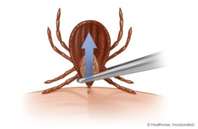|
Fleas and Ticks
Fleas and ticks are some the most common parasites found on dogs and cats in the United States. In Wisconsin they are generally more active from March through November, but can occur year round if they find their way indoors. Ticks, especially the deer tick, are very common in Northwest Wisconsin because they tend to stay near bodies of water and they use rodents and white-tailed deer as hosts during their reproductive cycle. Fleas are common because of their amazing reproductive ability. A single adult female flea can lay up to 50 eggs per day, which can lead to a population of thousands of fleas in just a few months.
Why are fleas dangerous?
Dog and cat fleas can and will bite humans, which can lead to irritating rashes. Some pets may have hundreds of irritating flea bites, while other less fortunate pets may have a severe allergic reaction to a single flea bite. This allergic reaction can cause severe itching, hair loss, as well as crusts and scabs on the skin which may become infected with bacteria. Pets with a severe flea infestation may become dehydrated, anemic, or may even die as a result of blood loss from multiple flea bites. Adult fleas are also known to carry tapeworm larvae which they can pass along to cats, dogs, and humans when they accidentally ingest them. Fleas can carry an organism called Bartonella henselae, which infected cats can pass to humans when they bite or scratch them. In humans Bartonella henselae is one of the causes of cat scratch disease which can cause swelling of the lymph nodes, fever, headaches, and fatigue.
Why are ticks dangerous?
Ticks can transmit such serious diseases as Lyme disease, ehrlichiosis, and anaplasmosis to both you and your pet. These diseases can cause anemia, tiredness, arthritis, and even severe kidney damage which can lead to death. Ticks may also cause serious problems if they attach to sensitive areas such as the inner ear or near the eye. When ticks attach to these areas pets may attempt to scratch them off which can lead to ear and eye trauma. If your pet has a tick they may carry it into your home. Because ticks generally leave a host after they take a blood meal and seek another host later, the tick your pet brings into your home could potentially pass a tick borne disease to you.
How do I know if my pet has a flea or tick problem?
There are numerous signs that indicate that your pet may have a flea or tick problem. You may notice your pet scratching occasionally or constantly. You may see tiny black dots on your pet which may be an indication of flea dirt, or flea feces. You may notice your pet has hair loss, and/or oozing scabby lesions on their neck, back, and base of their tail. You may even find small flea bites on yourself, especially around the ankles.
Signs of a tick borne disease may be less noticeable. In fact many pets may show no signs of a tick borne disease for five months after they have been bitten. Your pet may act tired, have a loss of appetite, develop a limp, or may be drinking and urinating more than usual. If you notice your pet has any signs of a flea infestation or a tick disease you should seek veterinary care immediately as these problems can progress and may lead to paralysis or death.
Are preventatives available?
Because fleas and ticks pose serious health risks to both humans and pets the Animal Hospital of Chetek and Animal Hospital North strongly recommend year round flea and tick prevention. We understand that the cost of flea and tick prevention may be prohibitive to some, if this is the case we urge you to use flea and tick preventatives from March through November when fleas and ticks are most active. There are many products on currently on the market including some oral tick preventatives. Some products are more effective than others and our staff will gladly help you decide which one is right for your dog and your budget at your next appointment.
For cats we recommended Revolution. Revolution is not only a safe and effective flea preventative, it also provides protection against heartworm disease, as well as roundworms and hookworms. If your cat is experiencing a heavy tick burden we recommend using Frontline Gold, as we are seeing some resistance to Frontline Plus. We will happily discuss which preventative is best for your pet at your next visit. Because some ticks are resistant to preventative medications we still suggest checking your pet for ticks daily, and after any trip to the lake or into the woods. Please consult a veterinarian prior to using any flea and tick prevention as some of these medications may work well in dogs, but could be deadly in cats and other pets.

I found a tick on my pet, what should I do?
If you find a tick on your pet you should remove it immediately by using a pointed tweezers or a tick removal tool with a cut slit on one side. Use the tool to grasp the tick firmly where it has entered your dog's skin, make sure you grab the head of tick to ensure you remove the whole tick. Maintain deliberate and steady pressure as you pull the tick straight out. If the entire tick is not removed the head may embed into the skin and cause a local infection. If this happens your pet should be seen by a veterinarian for the remainder of the tick to be removed. Once the tick is removed you can place it on a piece of tape or place it in a jar with rubbing alcohol to destroy it. Do not attempt to remove the tick with your fingers, crush the tick, burn the tick off, or use a chemical agent to remove it. Removing the tick any of the aforementioned ways may cause you to irritate the tick and cause it to regurgitate the contents of its stomach back into your pet's bloodstream which will increase the likelihood of your pet contracting a tick borne disease. If you find a tick on your pet and are unsure of what to do next please feel free to contact the Animal Hospital of Chetek or the Animal Hospital North.

I found a flea on my pet, what should I do?
Finding one flea or the presence of fleas on your pet is always a big deal because flea populations can explode in a matter of days and infestations are very difficult to control once they begin. If your pet is found to have adult fleas they can be treated with adulticidal flea medications as prescribed by your veterinarian; however, this is generally not enough as only 5% of a given flea population is at the adult stage and living on your pet. To make sure your pet does not become re-infested you will need to start preventative flea medications to keep adult fleas off of your pet. You will also need to vacuum frequently for the next few months in every place your pet may have been, including all furniture, curtains, and even your car. After vacuuming and removing all pet hair from your home, you will need to clean all furniture, pet beds, carpet, and vehicle interiors with HOT soapy water. This still may not be enough to destroy all flea eggs and larvae in your home. If you notice continued flea infestations you may need to contact a professional pest control agency.
***For more information you may visit the following websites:
http://www.petsandparasites.org/index.html
http://www.healthypet.com/
***The information provided on these pages is not to be used in place of a veterinary examination. Individual pet needs will vary. Do not begin flea and tick prevention without consulting with a licensed veterinarian.
|
